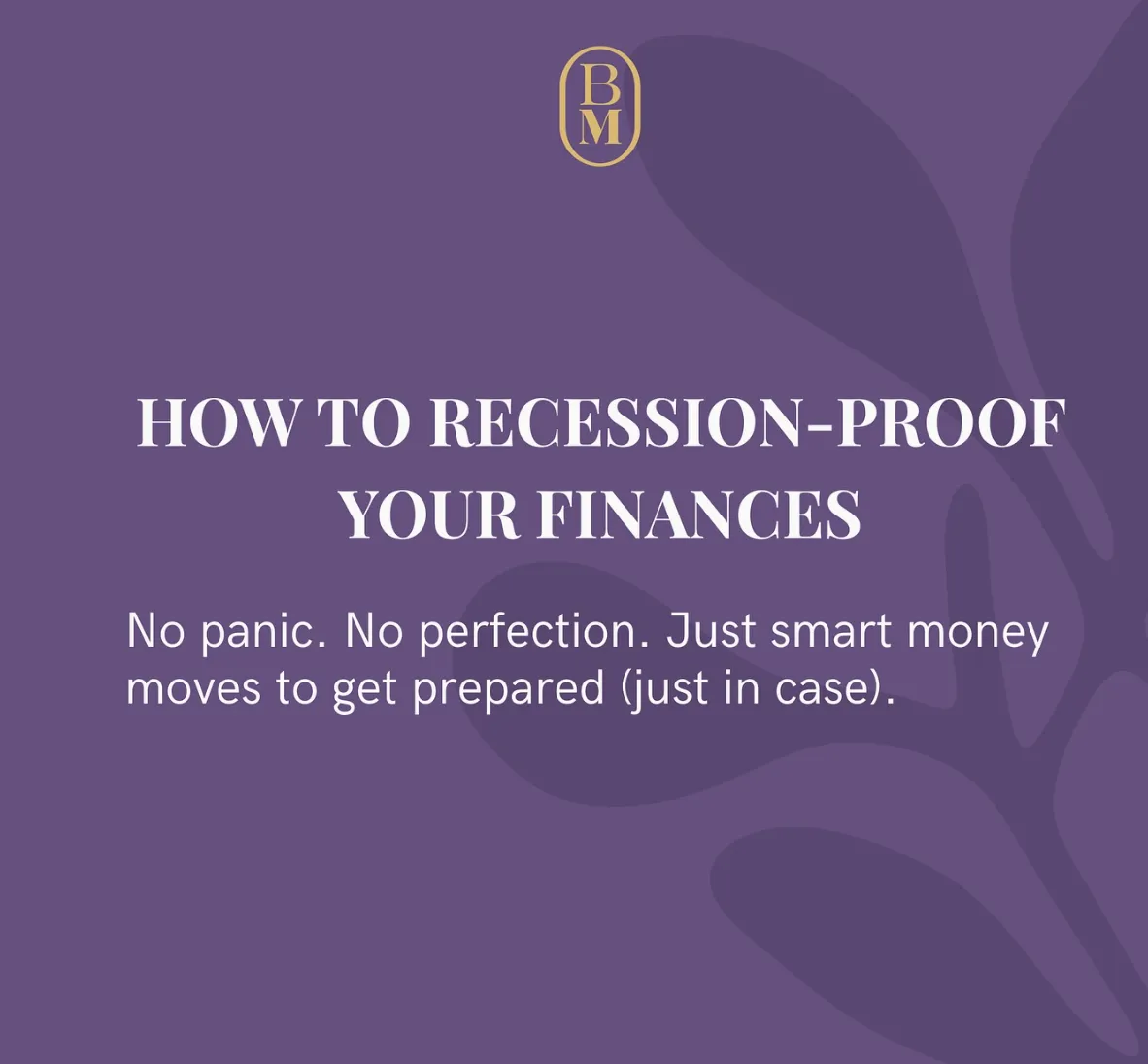
How to Recession Proof Your Finances
How to Recession-Proof Your Finances (Without Panic or Perfection)
If the word recession makes your stomach do a little dippity-doo, you’re not alone. Economic downturns can shake our sense of security, but they don’t have to unravel financial confidence.
I’ll break down a few smart steps that I take with my coaching clients that will help you not only weather a recession but will put you in a stronger position long after the economy bounces back.
Step 1. Know Where You Stand
Start with a clear-eyed look at your current finances. This is your financial foundation and starting point. The best way to do this is by;
Create a Net Worth statement: Assets minus liabilities = your net worth. This is where you lay out everything that you own and owe so that you can see a birds eye view of your financial situation.
Review (or create) your budget: Are your spending patterns aligned with your values and current goals? During uncertain times, this matters even more as we often have to cut back. If you don’t even know what you’re spending money on now (while you have a job), then this is a crucial activity to do.
If this part feels intimidating, you're not alone and you don’t have to do it perfectly. The point is to just do it. Head over to the Broad Money shop to purchase the Net Worth Statement and budget that I use with my clients.
Step 2. Prioritize Your Emergency Fund
Aim for 3–6 months of essential expenses (and no Ubers and DoorDash is not essential – sorry!). Tuck this money away in an easy-to-access out-of-sight-out-of-mind high-interest savings account. If 3-6 months feels daunting, then just start with anything. $500–$1,000 can make a world of a difference from an emotional and mental standpoint.
Tips:
Automate a transfer into your emergency fund the day after you get paid. This is the "Pay Yourself First" method.
Use part of your tax refund or bonus to build this fund faster.
Keep it separate from your day-to-day spending account, so you don’t see it.
Step 3. Reduce High-Interest Debt
Carrying credit card debt during a recession can feel like your ship is sinking even faster than before. While you’ve got an income coming in, focus on paying off high-interest (over 7%) balances first.
Here’s how to start.
Consider consolidating your high interest debts into low interest loans to alleviate some of the interest charges. If that’s not an option, then focus on either the;
Debt avalanche method (highest interest first) OR Debt snowball method (smallest balance first).
Quick Tip: Call creditors and ask about lowering interest rates. They’ll often want to work with you on this.
Step 4. Build Income Resilience
During a recession, job insecurity can spike. Diversifying your income streams is one way to cushion the blow.
Could you pick up a freelance gig based on a skill you already have?
Is there a side hustle you’ve thought about exploring?
Can you network intentionally now, rather than waiting until you need to?
Investing in your skills and visibility pays dividends, recession or not.
Step 5. Practice Values-Based Spending
This isn’t about cutting everything joyful from your budget. It’s about choosing how you spend your money from an intentional standpoint.
When I want to buy something that is not a necessity, I try to not buy it in the moment. I’ll think about how this purchase is going to make me feel and then determine if I’d feel better using that money for something else.
As a personal example, I just got back from a trip to Germany where I would normally fly business class and bid on an upgrade. But with the stock market being down right now and me wanting to retire at 45, I decided to hold off on the extra $600 I would have spent on the upgrade because I’d rather invest that money.
Before you next non-essential purchase, ask yourself:
“Does this purchase align with what matters most to me?”
“Is this a short-term dopamine hit or a long-term value?”
I often have clients tell me that they can start to hear me in their ear ask this question even when I’m not with them. Your money is powerful. Use it in ways that make you feel grounded, not guilty. Remember that every dollar that you have in your control is a dollar that can help you build wealth and alleviate anxiety/stress.
Step 6. Review (or Create) Your Financial Safety Nets
Insurance: Do you have adequate home, health, and disability coverage? Check PolicyMe or PolicyAdvisor for calculators and rates.
Wills and powers of attorney: We all need a Will – even if you’re young! It's a gift to your future self and it’s SHUPER easy to do. If you don’t have a complicated situation, then take a look at an online will kit like Willful.
Government benefits: Familiarize yourself with what’s available in a downturn, like Employment Insurance.
Final Thoughts from this Broad💬
Recession-proofing your finances doesn’t mean eliminating all risk. It means giving yourself options, confidence, and further clarity even when the world feels like a shit-storm is about to hit.
And remember, you don’t have to go it alone.
All of the above is exactly what I do with my coaching clients in my coaching program.
If you're looking for personalized support in mapping out your next financial moves or helping you prepare for uncertainty, please reach out for a free assessment call so I can explain what I do in coaching and how I can help.
I’ve been doing this for over 10+ years, so I’ve seen a lot of shit, and can help.
